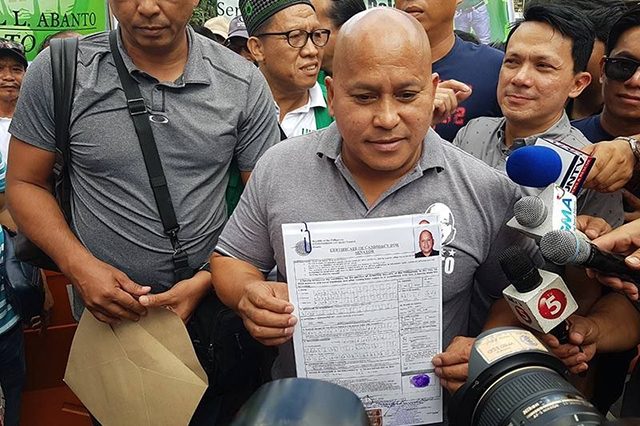
(Updated 11:54 p.m.) President Rodrigo Duterte threatened to terminate a long-term bilateral agreement as a knee-jerk response to the cancelation of Senator Ronald “Bato” dela Rosa’s U.S. visa despite his case being a personal matter.
Dela Rosa, former the head of the Philippine National Police who launched the bloody drug war called “Oplan Tokhang” in 2016, told reporters that he no longer has a visa to the United States. The neophyte senator flew there several times in the past years to watch matches of boxing champ and fellow senator Manny Pacquiao.
He was told to reapply at the U.S. Embassy again. Details on the time it was revoked was not provided.
When this development reached Duterte, the 1998 Visiting Forces Agreement (VFA) with the United States, which had its share of criticisms on national sovereignty, suddenly became a bargaining chip in exchange of the former top cop’s freedom to travel to the US.
“No more bases. They have to start to talk to us because they have to go. Kahiyaan ‘yan sa militar. Biro mo, isang sundalo nagtatrabaho lang tapos ganunin nila. I am putting them to humiliation itong mga pulis, mga sundalo,” Duterte said in a speech to communist rebels last January 22.
Duterte gave the U.S. one month to “correct” its mistake of barring Dela Rosa.
Presidential spokesperson Salvador Panelo later confirmed that the start of the termination process starts on January 24.
Wrong reasons to end the treaty
The VFA between the US and the Philippines concerns the treatment of the latter’s troops when they are here.
With this in place, the U.S. has jurisdiction over its military personnel unless the crime committed is punishable by Philippine laws only or the crime is related to the security of the country.
American troops are not subject to passport and visa regulations. Their driving licenses and permits are also considered valid in the Philippines.
This had long been criticized as a one-sided policy that only benefits Americans and critics have sought to terminate it before.
The sudden removal of the bilaetral agreement for Dela Rosa’s travel rights, however, doesn’t seem to be the right timing or reason to do so.
“Are we really risking whatever international cooperation and mutual defense we have so that Bato will be able to go shop and dine in the U.S.?” one user said.
The VFA should have ended long time ago but.. are we really risking whatever international cooperation and mutual defense we have so that Bato will be able to go shop and dine in the US? Nope. We are not taking this miserable old fool seriously. https://t.co/E8Vie69aOI
— CG (@christiangultz) January 23, 2020
Meanwhile, Sen. Panfilo Lacson pointed out that the old pact has no connection with visa revocations.
“A US visa is a conditional authorization granted to a foreigner. It may be cancelled without explanation or justification. The VFA is a bilateral agreement between the Philippines and the US that went through some careful and diplomatic discussion,” Lacson said on Twitter.
A US visa is a conditional authorization granted to a foreigner. It may be cancelled without explanation or justification. The VFA is a bilateral agreement between the Ph and the US that went through some careful and diplomatic discussion. Pray tell, where is the connection?
— PING LACSON (@iampinglacson) January 23, 2020
Panelo later shared a similar view that the US visa invalidation should’ve not been an issue given that Dela Rosa can reapply again.
“It’s the prerogative and right of every state to disallow or to allow any citizen of any country. I don’t know what reason it was canceled,” he said.
“Did the US state any reason for the cancellation? But I understand according to Senator Dela Rosa, the embassy told him if he wants to renew, he can re-apply. Pwede naman pala siyang mag-re-apply e. Sa akin, non-issue,” he added.
Foreign Affairs Secretary Teddy Locsin Jr., meanwhile, expressed his full support for Duterte’s actions and described it as a “good move.”
“Visas fall under US Justice Department in the Executive Branch either they’re serious about US-PH military alliance or not,” Locsin said on Twitter.
“They can have de Lima after her trial. In fact they can pass a law making her a US citizen and part of US military so she is covered by VFA,” he added.
Good move. Visas fall under US Justice Department in the Executive Branch. Either they're serious about US-PH military alliance or not. They can have de Lima after her trial. In fact they can pass a law making her a US citizen and part of US military so she is covered by VFA. https://t.co/KlmZyTEvqb
— Teddy Locsin Jr. (@teddyboylocsin) January 24, 2020
Possible reasons for the visa revocation
The U.S. embassy has yet to release the reason for the ex-top cop’s visa. Embassies around the world, however, have the right to deny and revoke any foreign national’s visa to enter their territories without disclosing their motive.
Dela Rosa saw two possible causes to reporters:
- Role in the illegal detention of Sen. Leila de Lima in February 2017
This was according to the recently signed Global Magnitsky Human Rights Accountability Act, wherein certain Philippine officials involved with the “wrongful” imprisonment of De Lima will be barred from entering the US. This was signed into law as part of America’s 2020 budget.
- Role as the chief architect of the bloody drug war
This was based on another American law, the Asia Reassurance Initiative Act, wherein foreign individuals and entities connected to violations of human rights, religious freedom and censorship activities shall receive financial penalties and visa ban sanctions.









